Toyota RAV4 (XA40) 2013-2018 Service Manual: Removal
- Remove package tray trim pocket subassembly (w/o rear no. 2 Seat)
- Remove tonneau cover assembly (w/o rear no. 2 Seat)
- Remove rear floor no. 1 Board (w/o rear no.
2 Seat)
- Remove deck board assembly (w/o rear no. 2 Seat)
- Remove rear floor no. 3 Board (w/o rear no.
2 Seat)
- Remove rear floor no. 2 Board (w/o rear no.
2 Seat)
- Remove rear floor no. 1 Mat support side plate (w/o rear no. 2 Seat) (see page ir-31)
- Remove back door weatherstrip (w/o rear no. 2 Seat)
- Remove rear floor finish plate (w/o rear no.
2 Seat) (see page ir-31)
- Remove reclining remote control lever bezel lh (w/o rear no. 2 Seat)
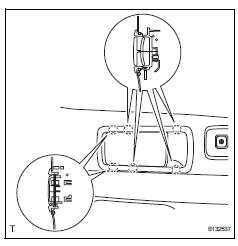
- Using a screwdriver, detach the 6 claws and remove the bezel.
Hint:
Tape the screwdriver tip before use.
- Remove tether anchor bracket subassembly (w/o rear no. 2 Seat) (see page ir-32)
- Remove deck trim side panel assembly lh (w/o rear no. 2 Seat) (see page ir-32)
- Remove reclining remote control lever sub-assembly lh (w/o rear no. 2 Seat)

- Remove the 2 bolts and lever.
- Disconnect the rear no. 1 Seat lock cable from the lever.
- Remove rear no. 5 Seat leg side cover
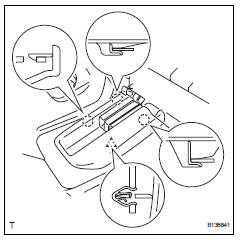
- Using a screwdriver, detach the 3 claws and clip, and remove the side cover.
Hint:
Tape the screwdriver tip before use.
- Remove rear no. 4 Seat leg side cover (w/ rear no. 2 Seat)
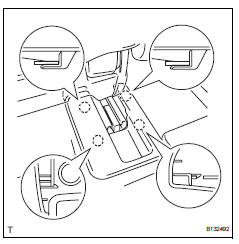
- Using a screwdriver, detach the 4 claws and remove the side cover.
Hint:
Tape the screwdriver tip before use.
- Remove rear no. 4 Seat leg side cover (w/o rear no. 2 Seat)
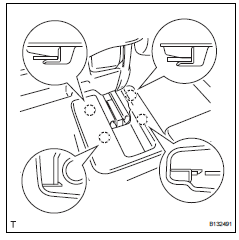
- Using a screwdriver, detach the 4 claws and remove the side cover.
Hint:
Tape the screwdriver tip before use.
- Remove rear no. 3 Seat leg side cover (w/ rear no. 2 Seat)
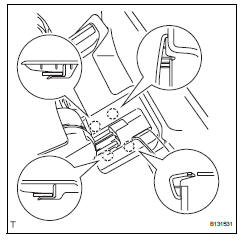
- Using a screwdriver, detach the 4 claws and remove the side cover.
Hint:
Tape the screwdriver tip before use.
- Remove rear no. 3 Seat leg side cover (w/o rear no. 2 Seat)
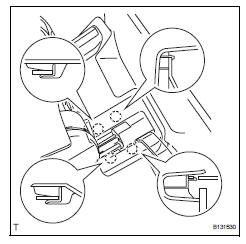
- Using a screwdriver, detach the 4 claws and remove the side cover.
Hint:
Tape the screwdriver tip before use.
- Remove rear seat leg cover
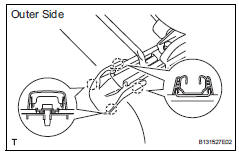
- Using a screwdriver, detach the 8 claws and remove the 2 leg covers.
Hint:
Tape the screwdriver tip before use.
- Remove rear seat lap type belt assembly center rh (w/ rear no. 2 Seat) (see page sb-39)
- Remove rear seat lap type belt assembly center rh (w/o rear no. 2 Seat) (see page sb-39)
- Remove rear no. 1 Seat lock cable assembly (w/o rear no. 2 Seat)
- Disconnect the lock cable from the seat.
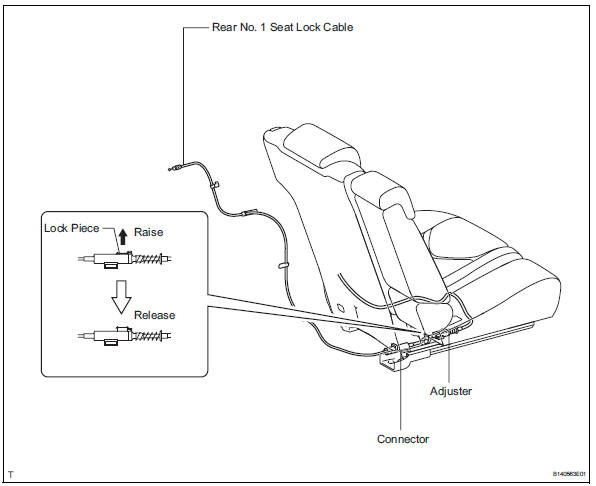
- Raise the adjuster's lock piece to release the lock.
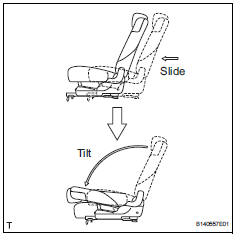
- Slide the seat forward and tilt the seatback forward.
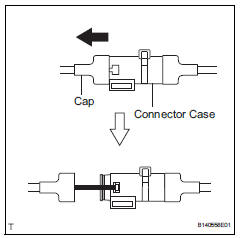
- Remove the seat's cap from the connector case.
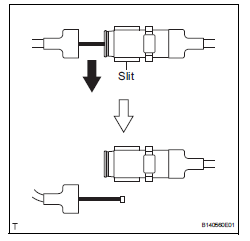
- Pull the seat's cap toward the outside of the vehicle. Then remove the cable from the connector case's slit.

- Remove the body's cap from the connector case.
- Detach the clamps and remove the lock cable.
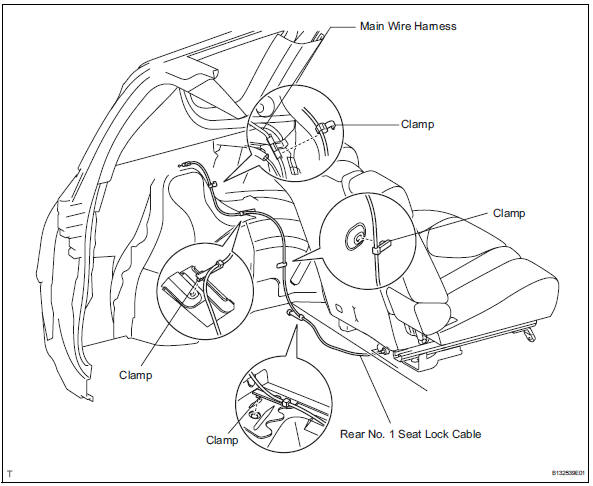
- Remove rear no. 1 Seat assembly lh
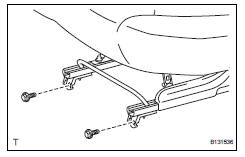
- Lift up the seat track adjusting handle and move the seat to the rearmost position.
- Remove the 2 bolts on the front side of the seat.
- Lift up the seat track adjusting handle and move the seat to the foremost position.
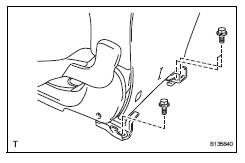
- Remove the 3 bolts on the rear side of the seat.
- Fully tilt the seatback forward. Then remove the seat.
Notice:
Be careful not to damage the vehicle body,
 Rear no. 1 Seat assembly (for lh side)
Rear no. 1 Seat assembly (for lh side)
Components
...
 Disassembly
Disassembly
Caution:
Wear protective gloves. Sharp areas on the seatback
frame, seat cushion frame and reclining adjuster may
injure your hands.
Remove rear seat headrest assembly
Remove rear seat center ...
Other materials:
Inspection
Inspect front seat outer belt assembly
Notice:
Do not disassemble the retractor.
Before installing the outer belt, check the elr.
When the inclination of the retractor is 15Đ or
less, check that the belt can be pulled from the
retractor. When the inclination of the retractor ...
Diagnosis system
Description
When troubleshooting obd ii (on-board diagnostics)
vehicles, the intelligent tester (complying with sae
j1987) must be connected to the dlc3 (data link
connector 3) of the vehicle. Various data in the vehicle's
ecm (engine control module) can be then read.
Obd ii regulations ...
Rear wiper motor
Components
Removal
Disconnect cable from negative battery
terminal
Caution:
Wait at least 90 seconds after disconnecting the
cable from the negative (-) battery terminal to
prevent airbag and seat belt pretensioner activation.
Remove back door center garnish (see page
ed-59)
...
